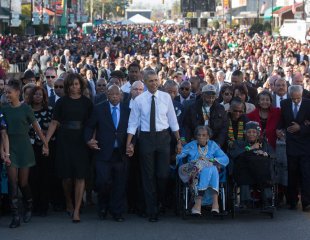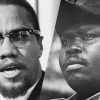
When Barack Obama ran for president in 2008 and 2012, he didn’t just run on hope and change. He made hundreds of promises, everything from changing the way CEOs are taxed to allowing Americans to buy prescription drugs abroad. Those and scores more didn’t happen. And he hasn’t really addressed some of the key issues that will mark his his legacy, such as his overseas assassination policies involving drones and special forces.
As Obama approaches his final year, it’s become trendy among supporters to say he has done the best he can given Republican obstructionists in Congress and red states. There is some truth to this notion. Obviously, he’s been better on most issues than a Republican would have been, and certainly far better than their new flock of candidates. But as the GOP has become radicalized and pulled the political center to the right, some of Obama’s moderate stances have been wrongly labeled as liberal, which demonstrates how far right the public debate has become.
We at AlterNet have prepared a report card looking at successes, failures and a number of incompletes as Obama enters the last of his eight years in the White House. While there are dozens of issues and policies we could have included, we have chosen five in each of these categories that are especially important, compelling or decisive.
Big Successes
1. Obamacare. The Affordable Care Act, despite its hiccups and compromises with the health insurance industry, is the largest new federal benefit program in decades. It has extended coverage to nearly 17 million people and many of the red-state governors who opposed its Medicaid expansion to help the poor are changing their minds, meaning Obamacare enrollees will keep growing. While the lack of choices for people in smaller states and rising costs are a real issue and are discouraging people from getting care, the Kaiser Family Foundation, which tracks U.S. health trends, says the ACA has lowered health care expenses for more people and employers than the opposite.
2. Stopping the great recession. As economist and New York Times columnist Paul Krugman has noted, Obama probaby would not have been elected without 2008’s crash led by the housing market implosion. George W. Bush’s response was spending $700 billion to prop up Wall Street institutions. Obama’s response was a similar scale stimulus package, which helped to reverse the hardship of millions of lost jobs and revive key sectors like the auto industry. Today, White House economic reports show the country is more or less back on its feet, although plenty of systemic inequality issues have yet to be addressed. But given that the crash mostly was driven by the private sector, Obama showed that the federal government has a major role to play in impacting America’s economic fortunes, should it choose to use that power.
3. Expanding civil rights. The highest-profile example is Obama’s reversal on same-sex marriage and LGBT equality issues. He began his presidency saying he opposed same-sex marriage and instead favored civil unions. But he changed his mind, and the Department of Justice joined the historic case in which the Supreme Court ruled for marriage equality. There are other areas where the Justice Department has fought for civil rights, though not always successfully. It lost a big Supreme Court case that overturned the enforcement threshold in the landmark 1965 Voting Rights Act, but has still sued to oppose new voter suppression laws in red states. Obama also reversed Bush-era anti-choice policies, including putting reproductive rights into Obamacare. The Justice Department has also pushed to ensure other affirmative action programs are followed, such as requiring a percent of government contracts go to women- and minority-owned businesses.
4. Embracing diplomacy. As 2015 ends, it may be hard to recall how much of a pariah nation the U.S. had become with George W. Bush’s war of choice in Iraq, which ousted Saddam Hussein and fueled the region’s ongoing civil wars. Obama’s initial efforts won back the respect of the European community, though he was criticized by the GOP for withdrawing regular U.S. ground troops (special forces and drones remain). While he did not get anywhere with an Israeli-Palestinian settlement or Russia’s land grab in Ukraine, Obama’s reopening relations with Cuba, recent deal on Iranian nuclear weapons and backing of a global climate change accord underscore that he believes in diplomacy, not just using military force.
5. Climate change and science. Nowhere is the contrast with the GOP more stark than on climate change. Obama has accepted the judgment of scientists, rejected the Keystone XL pipeline from Canada and has been engaged with climate change agreements. Early on, he reversed the Bush administration’s ban on funding stem-cell research and invested in solar energy. His Detroit auto industry bailout included higher fuel mileage standards. Obama is the first president to say global climate change is a real threat and he has pushed federal regulators to make the U.S. less dependent on carbon fuel, especially coal. His promise to adopt a carbon cap-and-trade system didn’t fly, but Obama pushed China to pledge reductions, including curtailing its massive reliance on coal, and he helped win passage of the global climate change accord in Paris in late 2015.
Big Failures
6. Empowering GOP extremists. There is a strong case to be made that Obama didn’t grasp how to use the presidency’s power—or podium—upon taking office and until his second term. A giant consequence was empowering today’s worst GOP obstructionists. By not rallying his base to vote in 2010, the Tea Party swept into office, giving the GOP control of the House, many state legislatures and governorships. Republicans then redrew congressional and state districts in once-a-decade redistricting that followed. That has locked in electoral advantages until after the next Census in 2020. These hardliners have since tried to block most of Obama’s big initiatives, from Obamacare to immigration. In the states, they’ve made it harder to vote and have rolled back reproductive rights.
7. Expanding the national security state. When running for office, Obama criticized Bush’s warrantless wirerap program that fed telephone data from all U.S. citizens calling overseas into spy agency computers. However, former Vice President Dick Cheney’s comment that Obama might come to appreciate the Bush administration’s effort has proved prophetic. Books have detailed how the security state has grown bigger under Obama to Edward Snowden’s disclosures about the true extent of government surveillance. Meanwhile, Obama has aggressively prosecuted whistleblowers who challenge the constitutionality of these programs. With the exception of torture, Obama has continued or expanded many Bush war-on-terrorism policies. The foremost example is his overseas drone warfare program, which as filmmaker Robert Greenwald has shown, has led to many civilian deaths with virtually no public accountability in Congress.
8. Expanding charter schools. Under Obama, this pet cause of the richest billionaires and high-tech executives has rapidly grown across America. This has been the case, even as charter schools, which are led by entrepreneurs and in some cases, scam artists, rake in profits from taxpayer funds, have not produced demonstrably better results than traditional public schools. Obama’s unflinching support of charters and privatizing education has not only seen millions taken from needy school districts, but caused a shift in education that is overly test-centered, anti-teacher unions, and usurps the power of parents and locally elected school boards. Under Obama, the privatizers—led by Bill Gates and the Walton family—have opened a huge area of government to an industry led more by entrepreneurs than teaching professionals.
9. Coddling corporate America. Obama has never pretended to be a national leader on economic justice like senators Elizabeth Warren and Bernie Sanders. But there is a difference between embracing reasonable policies that benefit big business and the public, and giving corporate America unneeded handouts or letting them off the hook for harming the economy and citizenry. Under Obama, almost nobody on Wall Street whose executive decisions played a big role in the 2008 crash was prosecuted. Meanwhile, the Dodd-Frank reforms passed to prevent another cycle of speculative boom and bust, are seen as doing little to change the financial sector’s worst instincts. Similarly, Obama has backed the pro-corporate Trans Pacific Partnership trade agreement, which gives private industry power to deflect and overrule government regulations, as well as monopolistic control over their respective sectors. It’s notable that Obama turned to Republicans, not Democrats, to back his trade policies.
10. Political reform obstructionist. Obama supporters from 2008 might recall how he pledged to challenge and change Washington’s political culture. If there is one issue that determines how Congress and federal agencies function, it’s the rules and laws governing money in politics. Yet Obama has repeatedly shown he doesn’t believe in reform or in trying to rebalance the disproportionate impact of the wealthy on elections and lobbying. He has twice backed away from issuing executive orders requiring federal contractors to disclose political giving, which would spotlight a culture of insider favoritism. This is not surprising. He was the first presidential candidate to reject public financing since it was created 40 years ago because he was raising more money than Sen. John McCain in 2008. He also promised he would bar executive branch employees from leaving and becoming lobbyists, but has not issued any rules to stop Washington’s revolving door.
Big Incompletes
11. Addressing economic inequality. There is a fundamental disconnect between the latest White House economic and jobs reports, recovery of the stock market’s value and well-being of middle- and working-class Americans. In short, Obama’s optimism about America’s economic recovery and future is out of synch with households that feel wage stagnation, debt burdens, higher education cost pressures and see rising health insurance and medical expenses—even with Obamacare. The success of both Bernie Sanders and Donald Trump is partly a response to frustrations many people feel about the economy and what the federal government could be doing to help. A review by PolitiFact of Obama’s campaign promises shows that most of his promises to shift the tax burden from average Americans to the wealthy have gone nowhere. Obama, meanwhile, has not made adressing economic inequalities a centerpiece of his rhetoric.
12. Comprehensive immigration reform. This is another major issue where the results have been more bad than good. Initially, Obama hoped a comprehensive bipartisan bill would pass Congress, but that effort died in the House. Several years later, he issued a series of executive orders exempting 40 percent of the 11 million undocumented people in the country from deportation—roughly the same percent as under GOP presidents Ronald Reagan and George H.W. Bush. But those orders have been blocked in federal court after red-state governors sued. Meanwhile, his administration has deported more than 2 million migrants and more roundups and deportations are slated for early in the new year, according to recent news reports.
13. Lessening gun violence in America. After every mass shooting, Obama has called for sensible federal gun control laws—especially limiting the ability of almost anyone to buy militarized weapons and instituting better screening of gun buyers. Many congressional Republicans and some Democrats have decried the carnage yet refused to take legislative action, pleasing the National Rifle Association. Obama was correct in his Oval Office speech after San Bernardino’s terrorist attack that most gun violence in America is not from foreign threats, but from suicides, domestic disputes and accidents. But he’s not been able to get anything through Congress.
14. Racist policing and police violence. As institutional police violence continues, with unarmed people being shot and killed by cops across America, Obama seems to be on both sides of this issue. As the first black president, he has spoken out against the racism, profiling and vigilantism of “stand your ground” laws. But his blue-ribbon commission on police reforms did not suggest taking surplus Pentagon weapons out of local law enforcement’s hands. It recommended better training, which is not reassuring. On criminal justice reform, like ending mandatory sentencing provisions that disproportionately have fallen on communities of color, he has pardoned or commuted the sentences of more than 100 people, yet thousands remain in prison.
15. Getting out of the Middle East’s wars. Obama’s promise to close the book on the post-9/11 wars in the Middle East seems ill-fated. After withdrawing most ground troops in Afghanistan and Iraq, those countries and Syria have plunged back into civil war, with factions brutalizing the populace. The Taliban and Al Qaeda are said to be returning in Afghanistan. ISIS, with its stark Islamic calpihate, has emerged in Syria and western Iraq. While Obama has relied on special forces and drone attacks, what the U.S. will do next militarily, especially with ISIS, is an open question. Obama’s stubborn goal of ousting Syrian dictator Bashar Assad has been frustrated by Russia’s entry into that war. Just as it does not appear Congress will let Obama close the prison at Guantanamo Bay, Cuba, it appears he will end his term with U.S. forces in Iraq and Afghanistan.
Grading the President
There are dozens of issues upon which Obama’s presidency can be judged and evaluated. At his best, he has shown that government can act in powerful ways to reorient its safety nets and the economy and be more responsive to public needs, without the sky falling as his critics have blared. Nowhere is that more evident than with Obamacare, which despite its flaws, has scores of provisions that expand access to health care and is pushing medicine toward a more prevention-oriented and cost-conscious focus. His trust in diplomacy and focus on beginning to address climate change is also laudable.
But Obama’s greatest early attraction, his aversion to the arrogant leadership of George W. Bush, is now being seen by many as wanting. Following the ISIS-inspired attacks in Paris and San Bernardino, national polls say he’s not seen by Americans as a reassuring counterweight to public fears over foreign threats. As David Axelrod, his 2008 political guru, told CNN, his response to Paris was “tone deaf.” His Oval Office speech after San Bernardino emphasized the need for gun controls, which is factually correct, as most of the country’s 33,000 annual gun deaths are from suicides or domestic disputes. But the public often seeks more visceral reassurance and its absence creates openings for loud opportunists, exemplified by Donald Trump.
While polls say most Democrats approve of Obama, the enthusiasm is gone. It’s common for sympathetic pundits to say he’s done the best he can given the GOP’s opposition. But for the most part, Obama’s accomplishments, failures and unfinished business show he’s been a president with a moderate record—except for the security state and drones—even if he’s labeled by his critics as liberal. As Republicans push the political center further to the right, it’s no wonder many Americans feel they have a half-satisfying president.
Steven Rosenfeld covers national political issues for AlterNet, including America’s retirement crisis, democracy and voting rights, and campaigns and elections. He is the author of “Count My Vote: A Citizen’s Guide to Voting” (AlterNet Books, 2008).














